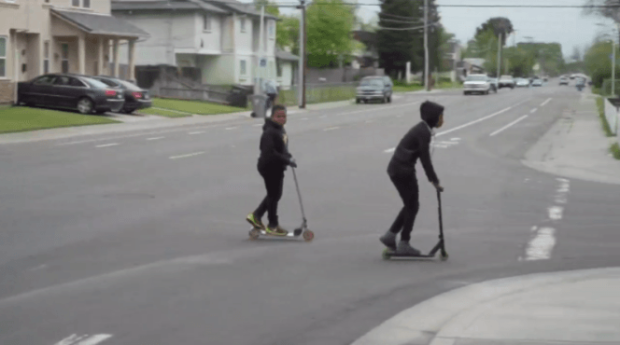This piece was originally posted on The Urban Phoenix and is reprinted here with permission.
Bikes have understandably and justifiably been a key transportation “alternative” for individuals in low-income communities to access jobs, resources, and public transit. Many cities have phenomenal programs and organizations that connect individuals who are in need of reliable transportation with cheap or free used bikes. For example, in my home city of Rochester, New York, R Community Bikes connects individuals with bikes for practical and affordable transportation and mobility.
But bikes are still relatively bulky, maintenance-dependent micro-mobility options. Why, instead, are we not talking about the ultra-practical, lower cost alternative of the kick-scooter as a means of equitable transportation?
Four years ago, I asked the question of why kick-scooters are not on the socially acceptable radar with regard to urban micro-mobility. Far more portable than a bike and much more stable than a skateboard, the ability of a kick scooter to fill the one- to three-mile gap for errands, commuting and “last-mile” needs when paired with mass transit is truly unique. But outside of major metros like New York and DC, non-electric scooters are seen as children’s toys, not transportation solutions.
This social dismissal of scooters as a legitimate piece of mobility for people of all income levels is unfortunate, to put it lightly. The potential to take the same energy a person spends walking while increasing the speed (and thus practical range) by 100 to 400 percent could be a game changer for the urban commuter of all socioeconomic statuses. No motors, no gears, no tires to inflate… kick scooters are the eight- to 10-pound portable urban transit solution that has yet to be realized. And one can purchase a sturdy, well constructed kick scooter for under $100 new.
But the tragedy that is the desire to conform to the socially acceptable image makes kick scooters an undesirable option, and one that most people would sparsely consider. If these micro-mobility heroes were accepted as a commonplace urban transportation solution for our poorest citizens who need more options, as well as for our middle-class city dwellers who desire more choices, our cities would greatly benefit.
Imagine for a moment that kick scooters were socially acceptable and free from the stigma of being a children’s toy. We could see kick scooter stores the same way we see bike shops… places where you could walk in and purchase a high-quality mobility solution for very little money. We could get our kick scooters oiled-up and maintained there, and maybe pick up a few accessories to make our scooter-commutes more palatable. Folks who are forced to walk to work or to the store could purchase a kick scooter cheaply and reduce their travel times by up to 400 percent. We would embrace the transit rider who hops on the bus holding a folded kick scooter, appreciating the scooter’s ability to provide last-mile, multi-modal connectivity for urban residents.
It’s silly right? The kick scooter is an extremely practical, low-cost urban transportation solution … but the social stigma associated with kick scooters universally inhibits the proliferation of scooters as a viable transportation alternative. My hope is that, in the future, a marketing campaign arises that establishes a sense of legitimacy for the kick scooter as a practical and affordable means of mobility. If scooters are continuously dismissed as a children’s toy, we are truly negating the potential of a low cost transit solution that can benefit city-dwellers from all walks of life.






